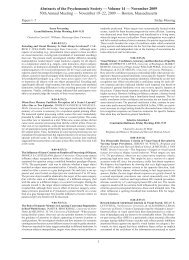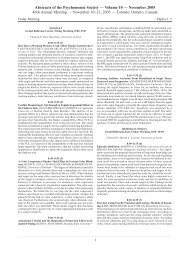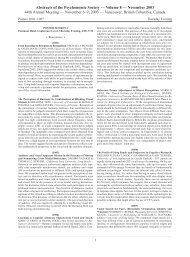S1 (FriAM 1-65) - The Psychonomic Society
S1 (FriAM 1-65) - The Psychonomic Society
S1 (FriAM 1-65) - The Psychonomic Society
Create successful ePaper yourself
Turn your PDF publications into a flip-book with our unique Google optimized e-Paper software.
Saturday Morning Papers 194–196<br />
ken words. When living in a new dialect region, however, processing<br />
difficulties associated with dialectal variation dissipate over time.<br />
Through a series of priming tasks (form priming, semantic priming,<br />
and long-term repetition priming), we investigate the role of experience<br />
in the perception and representation of dialectal variation. <strong>The</strong><br />
main questions addressed are: (1) How are cross-dialect variants recognized<br />
and stored, and (2) how are these variants accommodated by<br />
listeners with different levels of exposure to a particular dialect?<br />
Three claims are made based on the results: (1) Dialect production is<br />
not representative of dialect perception and representation, (2) experience<br />
is linked with a listener’s ability to recognize and represent spoken<br />
words, and (3) there is a general benefit for having the status as<br />
the “ideal” variant, even if this variant is not the most common one.<br />
11:00–11:15 (194)<br />
First Impressions and Last Resorts: How Listeners Adjust to<br />
Speaker Variability. TANYA KRALJIC, University of California,<br />
San Diego, & ARTHUR G. SAMUEL & SUSAN E. BRENNAN,<br />
Stony Brook University—<strong>The</strong> study of speech perception is fundamentally<br />
the search for processes that support perceptual constancy—<br />
the perception of a variable physical signal as relatively constant. Little<br />
reliable acoustic invariance exists in speech. We propose that<br />
speech perception processes recover invariants not about the signal,<br />
but about the source that produced the signal, and examine the evidence<br />
the system can use to do so. We find perceptual learning for<br />
properties of speech resulting from idiosyncratic speaker characteristics;<br />
the same properties are not learned when they can be attributed<br />
to incidental factors. In the absence of explicit attribution, the perceptual<br />
system may rely on episodic order (a “first-impressions”<br />
heuristic), but this heuristic can be overridden when relevant pragmatic<br />
information is available (e.g., if the listener sees that the<br />
speaker has a pen in her mouth). Perceptual learning is a powerful<br />
mechanism for coping with variability, but is applied flexibly and<br />
conservatively.<br />
11:20–11:35 (195)<br />
Exploring the Relationship Between Face Familiarity and<br />
Speechreadbility. KAREN LANDER, University of Manchester—<br />
30<br />
<strong>The</strong>ories of face perception suggest independence between identity<br />
and visual speech processing (Bruce & Young, 1986). In two experiments<br />
we explore how face familiarity influences speechreadability.<br />
In Experiment 1, we compare the speechreading performance from<br />
participants who are, or are not, artificially familiarized with the<br />
speaker. First, we measured baseline speechreading performance.<br />
Next, participants either view the speaker telling a story (familiarized<br />
group) or complete a pen and paper puzzle (control group).<br />
Speechreading performance is then measured again. Finally, participants<br />
view another story or complete another puzzle before<br />
speechreading performance is re-measured. <strong>The</strong> results suggest that<br />
speechreading performance improves faster when the participant is<br />
more familiar with the speaker. In Experiment 2 we explore this effect<br />
by comparing speechreading performance from a personally familiar<br />
face and an unfamiliar one. <strong>The</strong> results are discussed with regard<br />
to the independence of facial identity and visual speech<br />
processing and the factors that influence speechreading.<br />
11:40–11:55 (196)<br />
Penetrability of Speech Segmentation Strategies by Attentional<br />
Factors. SVEN L. MATTYS, University of Bristol—Although common<br />
in everyday listening conditions, attentional loads have been largely<br />
ignored in the literature on spoken-word recognition and segmentation.<br />
Here, we investigated whether listeners’ segmentation strategies<br />
are affected by a concurrent attentional load [the penetrability hypothesis]<br />
and, if so, whether the nature of the load (lexical-semantic<br />
vs. acoustic-phonetic) interacts with the nature of the segmentation<br />
strategy (knowledge-driven vs. signal-driven) (the domain-specificity<br />
hypothesis). Participants performed a segmentation task in one ear<br />
while performing either semantic categorization or phoneme monitoring<br />
on unrelated stimuli in the other ear. Compared to baseline,<br />
both loads were found to increase knowledge-driven segmentation.<br />
<strong>The</strong> results show that speech-processing mechanisms are penetrable<br />
by attentional factors and that this effect is not domain specific:<br />
Reliance on meaning is elevated whenever a processing load is encountered,<br />
regardless of the nature of the load. This result is discussed<br />
relative to theories of segmentation that give primacy to knowledgedriven<br />
strategies.





